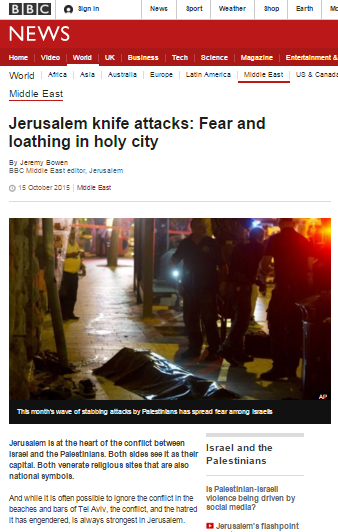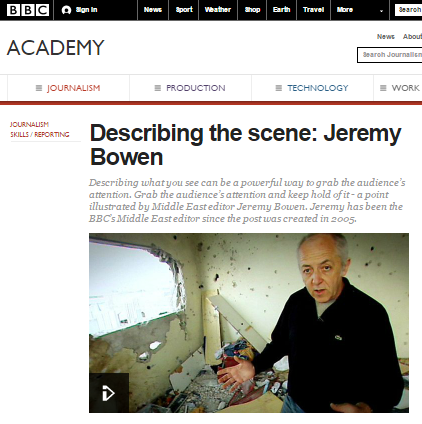The BBC News website’s coverage of the Iranian president’s visit to Europe late last month included two reports – “Rouhani in Europe: Italy covers nudes for Iran president“, January 26th and “Rouhani arrives in Paris as Iran drums up business with France“, January 27th – in which audiences were told that: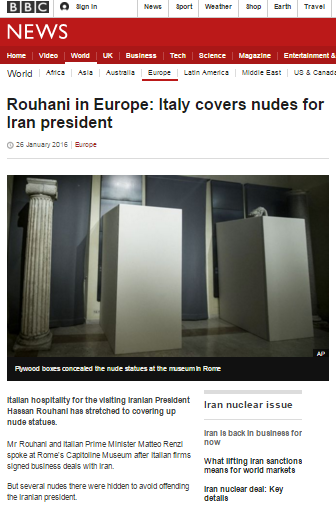
“Iran has been accused of funding militant groups, such as Hezbollah in Lebanon.”
Obviously that choice of minimalist phrasing does not clarify to readers who has accused Iran of funding “militant groups” (the BBC standard euphemism for terrorist organisations) or whether or not there is any basis to those accusations. It also obfuscates the fact that at least one Iranian official has acknowledged that Iran provides support to Hizballah.
A reader looking for more information might therefore have turned to the BBC’s profile of Iran which appears at the bottom of both reports. However, the only reference that topic to be found there is a no less coyly worded side box which fails to provide audiences with any relevant factual information.
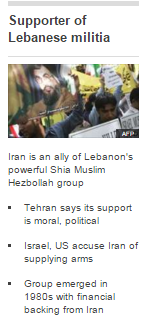
The BBC’s profile of Hizballah is equally uninformative on the issue of the financial and material backing received by that organization from Iran.
The US State Department defines Iran as one of the “State Sponsors of Terrorism” according to the following criterion.
“To designate a country as a State Sponsor of Terrorism, the Secretary of State must determine that the government of such country has repeatedly provided support for acts of international terrorism.”
The department’s report for 2014 (published in 2015) states:
“Designated as a State Sponsor of Terrorism in 1984, Iran continued its terrorist-related activity in 2014, including support for Palestinian terrorist groups in Gaza, Lebanese Hizballah, and various groups in Iraq and throughout the Middle East. This year, Iran increased its assistance to Iraqi Shia militias, one of which is a designated Foreign Terrorist Organization (FTO), in response to the Islamic State in Iraq and the Levant (ISIL) incursion into Iraq, and has continued to support other militia groups in the region. Iran also attempted to smuggle weapons to Palestinian terrorist groups in Gaza. While its main effort focused on supporting goals in the Middle East, particularly in Syria, Iran and its proxies also continued subtle efforts at growing influence elsewhere including in Africa, Asia, and, to a lesser extent, Latin America. Iran used the Islamic Revolutionary Guard Corps-Qods Force (IRGC-QF) to implement foreign policy goals, provide cover for intelligence operations, and create instability in the Middle East. The IRGC-QF is the regime’s primary mechanism for cultivating and supporting terrorists abroad.” […]
“Iran has historically provided weapons, training, and funding to Hamas and other Palestinian terrorist groups, including Palestine Islamic Jihad (PIJ) and the Popular Front for the Liberation of Palestine-General Command (PFLP-GC). These Palestinian terrorist groups have been behind a number of deaths from attacks originating in Gaza and the West Bank. Although Hamas’s ties to Tehran have been strained due to the Syrian civil war, in a November 25 speech, Supreme Leader Khamenei highlighted Iran’s military support to “Palestinian brothers” in Gaza and called for the West Bank to be similarly armed. In December, Hamas Deputy Leader Moussa Abu Marzouk announced bilateral relations with Iran and Hamas were “back on track.”” […]
“Since the end of the 2006 Israeli-Hizballah conflict, Iran has also assisted in rearming Lebanese Hizballah, in direct violation of UNSCR 1701. General Amir Ali Hajizadeh, head of the IRGC Aerospace Force stated in November that “The IRGC and Hezbollah are a single apparatus jointed together,” and Lebanese Hizballah Deputy Secretary General Naim Qassem boasted that Iran had provided his organization with missiles that had “pinpoint accuracy” in separate November public remarks. Iran has provided hundreds of millions of dollars in support of Lebanese Hizballah in Lebanon and has trained thousands of its fighters at camps in Iran. These trained fighters have used these skills in direct support of the Asad regime in Syria and, to a lesser extent, in support of operations against ISIL in Iraq. They have also continued to carry out attacks along the Lebanese border with Israel.”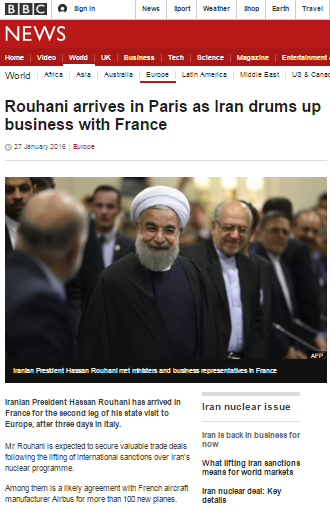
Those looking to BBC profiles for information on the financing of Hamas or the Palestinian Islamic Jihad would find no reference to Iran.
One of the foremost experts on Hizballah financing, Matthew Levitt, has noted that:
“Iran is believed to fund Hezbollah to the tune of at least $100 million per year. Recently, Western diplomats and analysts in Lebanon estimated Hezbollah receives closer to $200 million a year from Iran. […]
Some of this financial support comes in the form of cash funds, while much is believed to come in the form of material goods such as weapons. Iranian cargo planes deliver sophisticated weaponry, from rockets to small arms, to Hezbollah in regular flights to Damascus from Tehran. These weapons are offloaded in Syria and trucked to Hezbollah camps in Lebanon’s Bekaa Valley. In the wake of the death of Palestinian leader Yasser Arafat, Hezbollah reportedly received an additional $22 million from Iranian intelligence to support Palestinian terrorist groups and foment instability.”
More recently Mr Levitt has noted that:
“Iran has not changed its policies regarding the sponsorship of militants since late 2013, when nuclear talks began in earnest. “Iran continued to sponsor terrorist groups around the world, principally through its Islamic Revolutionary Guard Corps-Qods Force (IRGC-QF)…These groups included Lebanese Hizballah, several Iraqi Shia militant groups, Hamas, and Palestine Islamic Jihad,” according to the State Departments June 2015 report on terrorism. In addition, the State Department accused Iran of “prolonging the civil war in Syria, and worsening the human rights and refugee crisis there.” The report described Iran’s terror sponsorship as “undiminished.” It also noted that Iran increased training and funding for Iraqi militias in 2014, supplying them with advanced weaponry. Iran also “provided hundreds of millions of dollars” to Hezbollah and “trained thousands of [the group’s] fighters at camps in Iran.” The State Department concluded that it did not expect Iran’s behavior in Syria to change anytime soon, in part because “Iran views Syria as a crucial causeway in its weapons supply route” to the Shiite political party and militia Hezbollah, a key pillar in Tehran’s “resistance” front. Indeed, Iran continued to provide the Lebanese group with “training, weapons, and explosives, as well as political, diplomatic, monetary, and organizational aid.””
There is clearly ample information about Iran’s funding of terrorist organisations available in the public domain for the BBC to be able to fulfil its public purpose remit of building “a global understanding of international issues”. Instead the corporation chooses to sell its audiences short with euphemistic phrasing which fails to contribute to their knowledge of this pertinent issue.
Related Articles:
BBC News reframes Iranian arms shipment story, censors information
The terror group BBC audiences have never heard of
BBC’s Bowen plays dumb to weave tangled web


